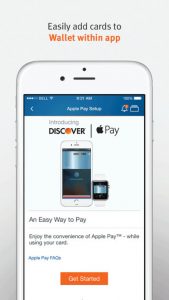Wider availability of technology that would have been nearly unthinkable only a few years ago is making biometric authentication a more likely replacement for the password. In the latest development, Discover Financial Services on Thursday announced users of its mobile app who own an iPhone X can log in to the app using the device’s innovative Face ID technology.
“Face ID provides Discover customers with an added security convenience at sign-in that requires no more than a quick glance at their iPhone X,” said Szabolcs Paldy, vice president for e-business at Riverwoods, Ill.-based Discover, in a statement.

The app allows users not only to manage their card account but also to access an account at Discover Bank. Most recently, the company started to allow wire transfers through the app, along with redemptions of Cashback bonuses for statement credit through Apple Inc.’s Apple Pay mobile wallet. Other features include remote deposit capture of checks, card-account freezes, and alerts. The app already supported Apple’s Touch ID fingerprint-authentication technology.
FaceID allows iPhone X users to access apps and services on the phone merely by looking at the screen. The technology reads facial characteristics and compares them to a reference file to grant or deny access. Reportedly, the technology cannot be spoofed with photos or even clay models of a person’s face.
The number of Discover cardholders who can use the new Face ID feature, however, is likely to remain limited for some time. Apple released the iPhone X, its most advanced smart-phone model yet, only on Nov. 3. It carries a minimum price of $1,000. A Discover spokesperson could not say how many cardholders have acquired the phone so far.
Still, Discover may tap into a growing appetite among consumers for the easier experience promised by biometrics-based authentication, according to survey results released Thursday by rival card network Visa Inc. “New forms of authentication, such as fingerprint, facial, and voice recognition, can make unlocking accounts and payments much easier and more convenient than traditional passwords or PINs…which are difficult to type onto tiny keyboards, easy to forget, and can be stolen,” Visa says in a press release.
In a canvass of 1,000 U.S. adults who are users of at least one credit or debit card or mobile-payment app, some 86% said they were interested in using biometric technologies, and more than 65% indicated they were already familiar with it. Some 70% said biometrics is easier than passwords or PINs, though concerns linger that the technology won’t work as well or might require repeated tries.
The most familiar biometric technology is fingerprint recognition, with 35% using it regularly. Some 32% have used voice recognition at one time or another, but only 9% use it routinely.
While half of consumers said eliminating the need to recall passwords or PINs is the chief benefit of biometrics, the respondents also displayed concerns about the security of the technology. Less than half—46%–said biometrics is more secure than passwords or PINs. This may be related to the concern of 49% that biometric data remains vulnerable to a data breach.
The survey was conducted by AYTM Market Research over the course of a week in September.






